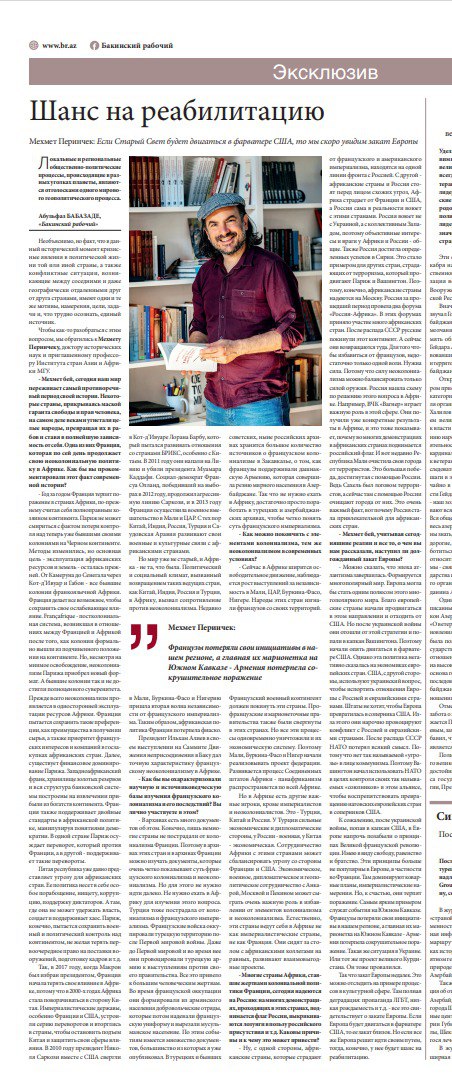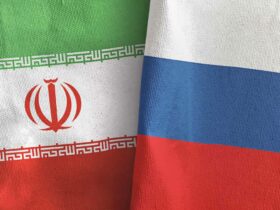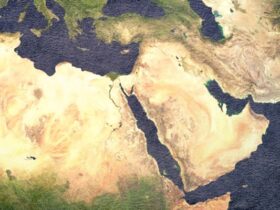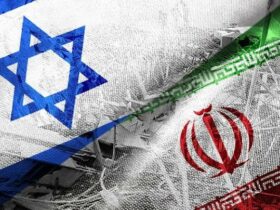United World International author Mehmet Perinçek gave an interview to the newspaper of the Azerbaijani Presidential Administration “Bakinsky Rabochy” about the neocolonial policy of France and events in Africa. We present the interview, published in Russian, to our readers translated into English.
————–
Local and regional socio-political processes occurring in different parts of the planet are echoes of one global geopolitical process.
It is inexplicable, but it is a fact that at a given historical moment, crisis phenomena in the political life of a particular country, as well as conflict situations arising between neighboring and even geographically distant countries, have the same motives, intentions, goals, objectives and, which is difficult to realize, is a single source.
To somehow sort out this issue, we turned to Mehmet Perinçek, Doctor of Historical Sciences.

Mr. Perinçek, today our world is going through the most controversial period of its history. Some countries, hiding behind the mask of a guarantor of freedom and human rights, actually oppressed entire peoples for centuries, turning them into slaves and making them completely dependent on themselves. One of them is France, which to this day continues its neocolonial policy in Africa. How would you comment on this fact of modern history?
Year after year, France suffers defeat in African countries, still considering itself the rightful master of the continent. Paris cannot come to terms with the fact of losing control over its now former colonies on the Dark Continent. The methods have changed, but the main goal – the exploitation of African resources and lands – remains the same. From Cameroon to Senegal via Ivory Coast and Gabon – all former colonies of French-speaking Africa. France is doing everything it can to maintain its waning influence. Françafrique is a post-colonial system that arose in relations between France and Africa after the colonies formally emerged from their subordinate position on the continent. But, despite the imaginary liberation, the neocolonialism of Paris acquired a new format. But the former colonies never achieved full sovereignty. First of all, neocolonialism manifests itself in the unilateral exploitation of Africa’s resources. France is trying to maintain such preferences as advantages in obtaining raw materials, as well as the priority of French interests and companies in government procurement of African countries. Then there is the financial dominance of Paris. The West African franc, the vault of gold reserves and the entire structure of the banking system are built on profiting from the wealth of the continent. France also maintains double standards in African politics by manipulating notions of democracy. In one country, Paris condemns a coup that is against France, and in another it supports such coups.
The Fifth Republic has long been a threat to African countries. Its policies carry special enslavement, poverty, corruption, and support for dictators. And where it cannot maintain power, it creates and maintains chaos. Paris, of course, is trying to maintain military and political control over the continent, not wanting to lose the primary right to supply weapons, train personnel, etc.
So, in 2017, when Macron was elected president, France began to lose its influence in Africa, because in the 2000s Africa began to turn towards China. Imperialist powers, especially France and the United States, staged a series of coups and invaded countries to stop the rise of China and protect their spheres of influence. In 2010, President Nicolas Sarkozy and the United States overthrew Laurent Barbou in Côte d’Ivoire, who was trying to develop relations with the BRICS countries, especially China. In 2011, they attacked Libya and killed President Muammar Gaddafi. Social Democrat François Hollande, who won the elections in 2012, continued Sarkozy’s aggressive line, and in 2013 France intervened militarily in Mali and the Central African Republic. Since then, China, India, Russia, Türkiye and Saudi Arabia have been developing their military and cultural ties with African countries.
But the world is no longer old, and Africa is not what it was. The political and social climate caused by the return of leading countries such as China, India, Russia and Türkiye to Africa generated resistance against neo-colonialism. Recently, a second wave of independence from French imperialism came to Mali, Burkina Faso and Nigeria. Thus, France’s African policy was a fiasco.
President Ilham Aliyev, in his speech at the Non-Aligned Movement Summit in Baku, gave an accurate description of French neo-colonialism in Africa.
How would you characterize the scientific and source study base for the study of French colonialism and its consequences? Are you personally involved in this?
There are many documents about this in the archives. Of course, there are few countries that were not affected by French colonialism. Therefore, in the archives of these countries and in the archives of France, one can study documents that very clearly show the essence of French colonialism and neo-colonialism. But you don’t have to go far for this. There is no need to go to Africa to study this issue. Türkiye also suffered from colonialism and French imperialism. French troops occupied Turkish territory after the First World War. Even before and during the First World War, they provoked Turkish Armenians to rebel against their government. All this led to great loss of life. During the French occupation, they formed volunteer units from the Armenian population, who then put on French uniforms and slaughtered the Muslim population. There are many documents on these events, most of which I have already published. Turkish and former Soviet, now Russian archives contain a large number of sources about French colonialism in Transcaucasia, about how the French supported Dashnak Armenia, which committed a massacre of civilians in Azerbaijan. So you don’t need to go to Africa, just work in Turkish and Azerbaijani archives to clearly understand the essence of French imperialism.
How can we put an end to the elements of colonialism, the same neo-colonialism, in modern conditions?
Now the liberation movement is expanding in Africa, there is an increase in protests for independence in Mali, the Central African Republic, Burkina Faso, and Niger. The peoples of these countries expelled the French from their territories. The French military contingent must leave these countries. Pro-French and puppet governments were also overthrown in these countries. But all these processes simultaneously destroyed their economic system. Therefore, Mali, Burkina Faso and Niger began to implement the federation project. The process of the United States of Africa is developing – Pan-Africanism is spreading throughout Africa.
But there are other important players in Africa besides the imperialists and neo-colonialists. These are Türkiye, China and Russia. Türkiye has strong economic and diplomatic sides, Russia has a strong military side, and China has a strong economic side. Africa’s cooperation with these countries can balance the threat from France and the United States. Economic, military, diplomatic and geopolitical cooperation with Ankara, Moscow and Beijing can play a very important role in getting rid of elements of colonialism and neo-colonialism. Naturally, these countries behave in Africa not like imperialist countries, not like France. They sit at the table with their African colleagues on equal terms and develop mutually beneficial projects.
Many African countries that have become victims of the colonial policy of France today rely on Russia: at many demonstrations taking place in these countries, the Russian flag is raised, slogans are shouted in favor of the Russian presence, etc. What are the reasons and what can this lead to?
Well, on the one hand, African countries that suffer from French and American imperialism are on the same front line with Russia. On the other hand, African countries and Russia face similar threats, Africa suffers from France and the United States, and Russia itself is in reality at war with these countries. Russia is not at war with Ukraine, but with the collective West, so Africa and Russia have common objective interests and enemies. Russia has also achieved some success in Syria. This has become an example for other countries suffering from the terrorism promoted by Paris and Washington. Therefore, of course, African countries rely on Moscow. Over the past period, Russia has held two Russia-Africa forums. Many African countries took part in these forums. After the collapse of the USSR, Russians left this continent. And now they are returning there. In order to get rid of the French, will alone is not enough. Need strength. Because the power of neocolonialism can only be balanced by force of arms. Russia has found a scheme to resolve this issue in Africa. For example, the PCM Wagner played an important role in this area. They have already received concrete results in Africa, and this also shows why the Russian flag is raised in many demonstrations in African countries. And recently the Republic of Mali cleared its cities of terrorists. This is a great victory achieved with the help of Russia. After all, the Sahel was a den of terrorists, and now with the help of Russia they are clearing the cities of them. This is a very important fact, which is why Russia has become attractive to African countries.
Mr. Perinçek, taking into account today’s realities and everything that you told us about, has the long-awaited decline of Europe arrived?
We can say that the era of Atlanticism is over. A multipolar world is emerging. Europe could become one pole of this multipolar world. Fortunately, European countries have begun to move in this direction and move away from the United States. But after the Ukrainian war, they abandoned this strategy and fell into Washington’s trap. Therefore, we began to move again in the wake of the United States. However, this policy had a negative impact on the economies of European countries. The US, on the other hand, is using the Ukrainian issue to ruin Europe’s relations with Russia and Eurasian countries. The States do not want Europe to become a rival to the United States. Because of this, they deliberately provoke a conflict with Russia and Eurasian countries. After the collapse of the USSR, NATO lost all meaning. Because there is no so-called “threat” in the face of communism. Therefore, Washington began to use NATO to control its so-called “allies” in this alliance in order to prevent NATO European countries from becoming rivals of the United States.
Unfortunately, after the Ukrainian war, having fallen into the US trap, Europe completely forgot about the principles of the Great French Revolution. I mean freedom, equality and fraternity. These principles are no longer popular in Europe, particularly in France. Insidious plans and imperialist intentions dominate there. But, fortunately, they are defeated. The most striking example is the events in the South Caucasus. The French have lost their initiatives in our region, and their main puppet in the South Caucasus, Armenia, suffered a crushing defeat. The same situation is in Ukraine. Or the same project of “Great Kurdistan”. He also failed.
So, the decline of Europe is not far off. This can be traced using the example of processes in the cultural sphere. There is complete degradation there: LGBT propaganda, low birth rates, etc. – all this indicates the decline of Europe. If Europe moves in the wake of the United States, its decline is near. But if Europe nevertheless decides to go its own way, then, of course, it will have a chance for rehabilitation.

















Leave a Reply